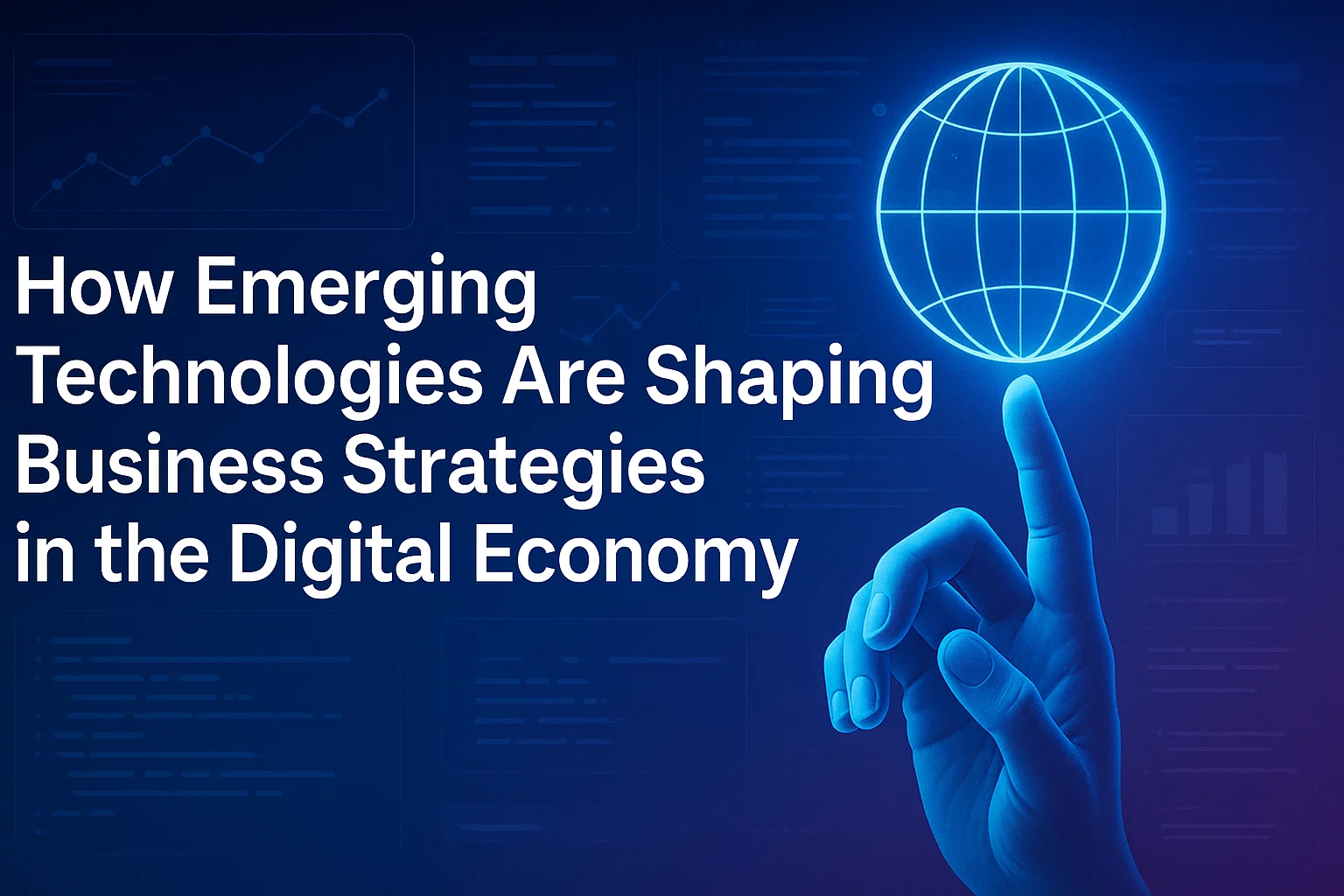
How Emerging Technologies Are Shaping Business Strategies in the Digital Economy

The fast-paced environment of the 21 st century has seen the emerging technologies are not just optional upgrades; they are key drivers of change, innovation, and competitive advantage. From artificial intelligence and blockchain to the Internet of Things and cloud computing, these technologies are changing the way organizations operate, make choices, communicate with users, and even prepare for the future.
The fast-paced environment of the 21 st century has seen the emerging technologies are not just optional upgrades; they are key drivers of change, innovation, and competitive advantage. From artificial intelligence and blockchain to the Internet of Things and cloud computing, these technologies are changing the way organizations operate, make choices, communicate with users, and even prepare for the future.
This article investigates how emerging technologies are changing company strategy in the digital economy, as well as what forward-thinking firms can do to stay ahead of the competition.
Understanding The Digital Economy
Digital economy is an economy which is grounded on digital computing technologies. It includes the entire business, social and cultural practices that are aided by the internet and digital tools. The digital economy is fundamentally based on data, connection, and innovation.
As the economy grows, businesses need to move away from old ways of doing things and start thinking digital first if they want to keep up and succeed.
Key Emerging Technologies Transforming Business Strategies
1. Artificial Intelligence (AI) and Machine Learning
Machine learning and AI are helping companies to achieve process automation, individual customer experiences, and predictive capabilities. Such technologies enable businesses to make decisions (faster and data-driven) and minimize operational inefficiencies.
Strategic Implications:
- Improved customer service using virtual assistants and chatbots.
- Predictive analytics for consumer behavior and market trends.
- Improved logistics and inventory control.
2. Cloud Computing
The way that companies handle data, apps, and IT infrastructure has been completely transformed by cloud technology. It facilitates company continuity, cooperation, and scalability.
Strategic Implications:
- Reduced expenses for IT and infrastructure upkeep.
- Real-time data access from any location.
- Quicker implementation of services and apps.
3. Blockchain
Blockchain provides transparent, secure, and decentralized data management, transaction, and supply chain solutions. It is specifically revolutionary to finance, logistics and contract management.
Strategic Implications:
- Increased security and less fraud.
- Sustainable and more effective supply chains.
- Automated legal agreements in the form of smart contracts.
4. Internet of Things (IoT)
IoT is about connecting physical devices to the internet so that they can be monitored and collect data in real-time. It changes such industries as manufacturing, retail, agriculture, and healthcare.
Strategic Implications:
- Equipment predictive maintenance.
- Connected products can provide real-time customer data.
- Routine tasks automation.
5. Big Data and Advanced Analytics
Big data technologies assist organizations in making sense of large amounts of data as a result of the explosion of digital data. Analytics software transforms raw data into usable information.
Strategic Implications:
- Accurater customer segmentation.
- Enhanced advertising initiatives.
- Better departmental decision-making.
6. 5G Technology
The 5G technology will provide more reliable and quicker wireless connections and pave the way to new advances in remote working, virtual experiences and mobile shopping.
Strategic Implications:
- Mobile access and remote collaboration that works seamlessly.
- Improved consumer experiences using AR and VR.
- Data transmission in real time for smart devices.
How Businesses Are Adapting Their Strategies
1. Digital Transformation as a Core Objective
Businesses don’t treat digital as an add-on anymore. It’s a main focus now. Investing in the right tools and systems is something they need to do if they want to stay flexible and keep up.
2. Customer-Centric Models
Businesses may now better understand, predict, and satisfy their customers’ demands due to emerging technology. It is now expected to be personalized, convenient and fast.
3. Agile and Data-Driven Decision Making
Companies that use real-time analytics and machine learning can swiftly modify their tactics in response to market developments, customer behavior, or internal indicators.
4. Accepting Ecosystem Collaboration
Collaborations with cloud providers, software developers, data scientists, and innovation hubs are frequently required for tech-driven initiatives to deliver value.
5. Upskilling and Workforce Transformation
To capitalize on emerging technology, firms are investing in digital skills training, employing tech-savvy employees, and rethinking jobs to support a hybrid human-digital workforce.
Challenges and Considerations
There’s no doubt that new technology opens a lot of doors—but it also brings some real challenges. Here are a few that businesses need to deal with:
- Cybersecurity threats – The more a company goes digital, the more exposed it becomes. Protecting data and systems is now a must, not an option.
- Slow tech adoption in older industries – Some industries still rely on old ways of working, and switching to new tools can be tough or take longer than expected.
- Privacy and ethics – As businesses collect more data and use AI or automation, there are growing concerns about how that data is used, and what’s fair or ethical.
- High costs for small businesses – To a new or small corporation the cost of maintaining new technology may be an obstacle.
It is not simple to address these obstacles. That requires strong leadership, desire to continue learning and a future-focused mindset. Companies that stay open to change and invest in the right areas will be the ones that move forward—and stay ahead.
Future Outlook: Strategy in the Digital Age
The businesses that will lead in the future aren’t just using technology—they’re using it in ways that truly matter. Here’s what sets them apart:
- They match technology with real goals – It’s not about using every new tool out there. It’s about picking the ones that actually help the business grow and move forward.
- They stay flexible – Change is constant. The companies that test new ideas, adapt quickly, and stay open to change will stay ahead.
- They build everything around digital and data – Digital tools and real data are part of everyday decisions, not just a side piece.
- They create the right culture – It’s not just about the tech. It’s about having teams that are curious, open to learning, and ready to grow with it.
Final Thoughts
Emerging technologies are not simply helpful tools, they are transforming the way business operates on all levels. The companies that use them wisely can find new ways to grow, work faster and smarter, and build better relationships with their customers.
Now’s the time to take action. At VrdApps, we help businesses embrace change, invest in the right digital solutions, and shape strategies that are built to last.


